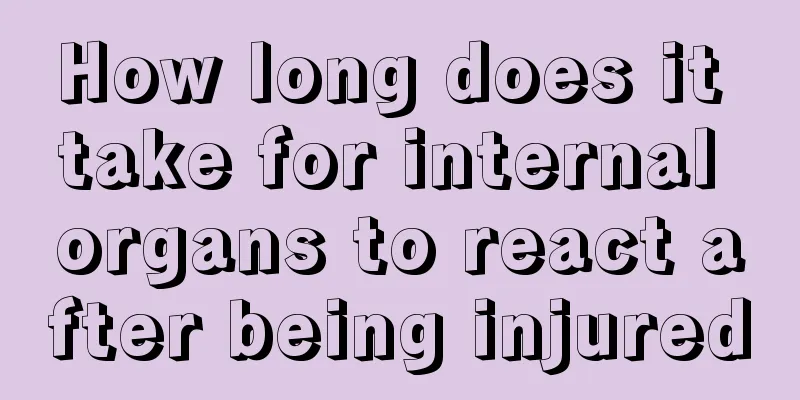How long does it take for internal organs to react after being injured

|
The harm caused by internal organ injury is relatively large, and it can cause a variety of symptoms. The most obvious is chest pain, which can cause coughing and abdominal pain. More serious cases can cause low blood pressure and cause stronger toothache or rebound pain. If there is damage and harm to the lower gastrointestinal tract, it can easily cause perforation. At this time, first aid methods must be taken to treat it. Let us learn about it. How long does it take for internal organs to react after being injured? Chest pain, cough, abdominal pain, low blood pressure. When the stomach, duodenum or upper jejunum is damaged, the leaked digestive juice (including gastric juice, pancreatic juice and bile) produces strong chemical stimulation to the peritoneum, immediately causing severe pain, and typical peritonitis manifestations such as abdominal muscle tension, tenderness, rebound tenderness, etc. When the lower gastrointestinal tract ruptures, the chemical irritation caused by the leaked material is milder, and the signs of peritonitis appear later and are less severe. Whether it is rupture or perforation of the upper or lower gastrointestinal tract organs, it will eventually cause bacterial peritonitis, but the bacterial contamination caused by rupture or perforation of the lower gastrointestinal tract organs is far more serious than that of rupture or perforation of the upper gastrointestinal tract. As peritonitis progresses, abdominal distension gradually appears due to intestinal paralysis, and in severe cases, septic shock may occur. After the rupture of a hollow organ, there may be free gas in the abdominal cavity, causing the boundary of hepatic dullness to shrink or disappear. In addition, injuries to the stomach and posterior duodenum may cause vomiting of blood, and injuries to the rectum often result in bright red bloody stools. Patients with retroperitoneal duodenal rupture may sometimes present with symptoms and signs such as testicular pain, scrotal hematoma, and priapism. Multiple injuries If both solid and hollow organs rupture at the same time, clinical manifestations of hemorrhage and peritonitis may occur simultaneously. The clinical manifestations of multiple injuries are more complicated. For example, patients with severe craniocerebral injuries may experience impaired consciousness. Symptoms of chest injuries, spinal or pelvic fractures are often obvious and may mask the manifestations of abdominal injuries, which should be paid attention to. |
<<: Feeling something at the base of tongue
>>: Distribution of human internal organs
Recommend
Talk about the overview of fibroid disease
Fibroids are a very common disease in daily life....
Normal estradiol values during menstruation, detailed explanation of the relationship between estradiol values and ovarian health
The normal value of estradiol during menstruation...
What should I pay attention to in my diet when I have digestive tract perforation
Patients with gastrointestinal perforation must p...
Is endometrial cancer contagious?
Is female endometrial cancer contagious? Female e...
Ascites is the main symptom of ovarian cancer
Ovarian cancer has a relatively high incidence ra...
The efficacy and role of Chinese herbal medicine cat's claw on breast cancer
Cat's claw is the dried root of Ranunculaceae...
What food to eat when blood supply is insufficient
Insufficient blood supply has a great impact on t...
What are the causes of neck lymph node pain
In our daily lives, we should pay more attention ...
How to choose rice safely
Food safety has become a topic of great concern i...
What disease may cause skin depression
If you suddenly feel depressions on your skin, yo...
My mouth feels sour after eating
We eat a lot every day, and eating itself is a ve...
The effect of beer on muscles
Beer has a relatively large impact on muscles bec...
Introduction to common medical diagnosis methods for bone cancer
Medically, the diagnosis of bone cancer is relati...
What to do if your waist hurts from hula hooping
The back pain caused by hula hooping is because t...
Can pregnant women drink jasmine tea?
Jasmine tea is a type of tea that has always been...









